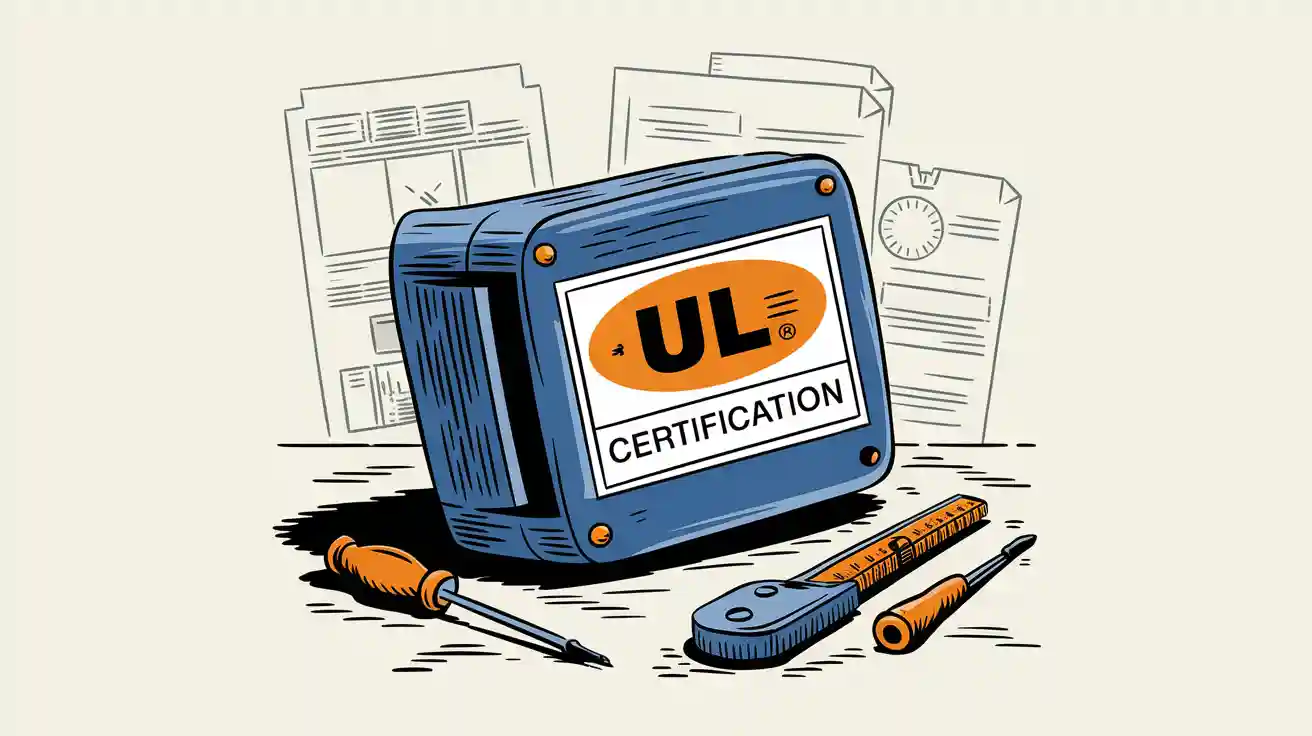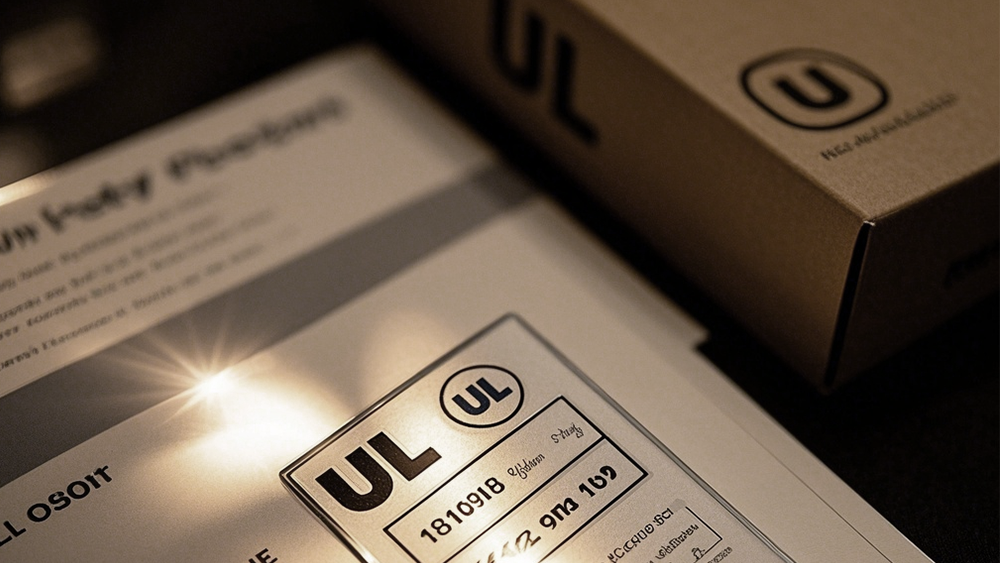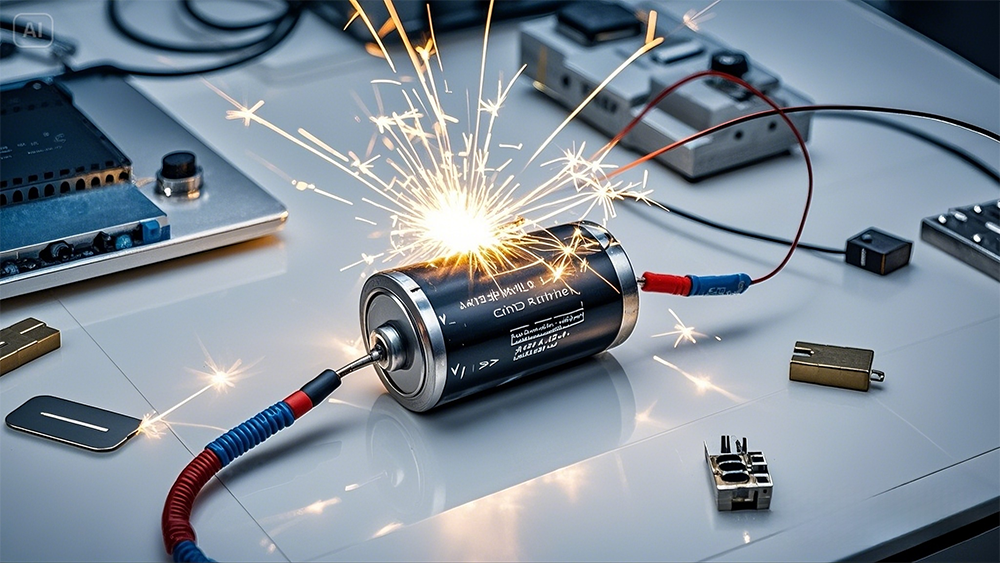-
Key Takeaways
-
Part 1: What is UL Certification?+
- 1.1 Definition and Purpose of UL Certification
- 1.2 Why UL Certification is Essential for Lithium Batteries
-
Part 2: Why UL Certification Matters+
- 2.1 Enhancing Safety and Reducing Risks in Lithium Batteries
- 2.2 Building Consumer and Industry Trust with the UL Certified Label
- 2.3 UL Certification is Required to Enter the North American Market
-
Part 3: Types of UL Certifications+
- 3.1 Overview of UL Certification Categories
- 3.2 UL 2054 Certifications for Lithium Batteries Pack
- 3.3 UL 1642 Certifications for Lithium Battery Cells
- 3.4 Market Access Relevance
-
FAQ+
- What is the significance of the UL certified mark for lithium battery packs?
- How does the UL certified label impact market access?
- How long does it take to apply for UL certification?
What You Need to Know About UL Certification
APR 14, 2025 Pageview:208

UL Certification represents a globally recognized benchmark for safety and reliability. It ensures that products, including lithium battery packs, meet stringent UL standards. You can rely on this certification to reduce risks, enhance compliance, and build trust. UL plays a critical role in safeguarding users and aligning with regulatory requirements.
Key Takeaways
UL Certification shows products follow strict safety rules, keeping people safe.
Getting UL Certification for lithium batteries is important to follow rules and lower safety dangers.
The UL Certified Label means tough tests were done, helping makers gain trust and sell in more places.
Part 1: What is UL Certification?
1.1 Definition and Purpose of UL Certification
UL Certification is a globally recognized product safety certification that ensures products meet stringent safety standards. It is issued by Underwriters Laboratories (UL), a Nationally Recognized Testing Laboratory (NRTL) in the United States. This certification signifies that a product has undergone rigorous testing to verify its compliance with safety regulations.
The purpose of UL Certification extends beyond compliance. It enhances consumer safety, builds trust, and ensures that products perform reliably under various conditions. Manufacturers benefit from the certification by demonstrating their commitment to quality and safety.
Key benefits of UL Certification include:
High standards of testing for safety and performance.
Assurance of consumer safety through rigorous evaluations.j
Increased consumer confidence in certified products.
UL has a long history of establishing safety standards. From its early work in 1907 to its current role in industries like consumer electronics and environmental safety, UL continues to set benchmarks for product safety certification.
1.2 Why UL Certification is Essential for Lithium Batteries
Lithium batteries power a wide range of devices, from consumer electronics to industrial equipment. However, their high energy density and chemical composition pose safety risks, including fire hazards. UL Certification plays a critical role in mitigating these risks by ensuring that lithium batteries meet strict safety standards.
The growing use of lithium batteries in robotics and handheld devices has raised public safety concerns. Local governments now require UL Certification for these products to address fire hazards. This regulatory trend highlights the importance of UL standards in ensuring the safety and reliability of lithium batteries.
Manufacturers of lithium batteries must prioritize UL Certification to meet market demands and regulatory requirements. By obtaining this certification, you can enhance your product's safety, gain consumer trust, and ensure compliance with safety standards.
Part 2: Why UL Certification Matters
2.1 Enhancing Safety and Reducing Risks in Lithium Batteries
Lithium batteries are essential in powering modern devices, but their high energy density can pose significant safety risks. UL Certification ensures that these batteries meet stringent safety standards, reducing the likelihood of malfunctions such as overheating or fire. By adhering to the rigorous testing protocols established by Underwriters Laboratories, manufacturers can identify and address potential hazards during the design phase.
The UL Listed Mark on a lithium battery pack signifies compliance with safety requirements. This mark assures you that the product has undergone thorough evaluations to meet industry standards. For businesses, this certification minimizes liability risks and enhances product reliability. It also demonstrates a proactive approach to safety, which is critical in industries where battery performance directly impacts user safety.
2.2 Building Consumer and Industry Trust with the UL Certified Label
The UL Certified Label is more than just a mark; it is a symbol of trust and reliability. When you see this label, it assures you that the product has been tested for safety and compliance. This trust extends to both consumers and industry stakeholders, making UL certifications a valuable asset for manufacturers.
For businesses, the UL Recognized Component Mark on lithium battery components signals a commitment to quality. This recognition builds confidence among partners and clients, fostering long-term relationships. It also positions your brand as a leader in safety and innovation.
2.3 UL Certification is Required to Enter the North American Market
If you aim to sell lithium battery packs in North America, UL certification is non-negotiable. Regulatory bodies and retailers often mandate compliance with UL standards to ensure product safety. The UL Listed Mark serves as proof that your product meets these requirements, streamlining market entry.
Underwriters Laboratories has established itself as a trusted authority in safety certifications. By obtaining the UL Recognized Component Mark, you demonstrate adherence to the highest safety standards.
This not only facilitates market access but also enhances your brand's reputation in a competitive industry.While UL certification is not legally mandatory in the U.S., it is widely required by consumers, procurement agencies, and e-commerce platforms like Amazon as core proof of product safety.
Over 40,000 U.S. jurisdictions (federal, state, and local) recognize UL certification. For lithium batteries, compliance with UL 2054 (battery packs) and UL 1642 (battery cells) is critical for market access.
Part 3: Types of UL Certifications
3.1 Overview of UL Certification Categories
UL certifications span product safety, fire resistance, industrial systems, renewable energy, and cybersecurity. For lithium batteries, focus on UL 1642 (battery cells) and UL 2054 (battery packs),which ensures compliance with rigorous safety testing protocols to meet North American and international market requirements. These standards validate critical safety aspects such as short-circuit resistance, overcharge tolerance, mechanical durability (e.g., crush and impact tests), and environmental stability (e.g., thermal shock and altitude simulation). By adhering to UL 1642 (for individual battery cells) and UL 2054 (for assembled battery systems), manufacturers demonstrate compliance with safety benchmarks required for market access in the U.S., Canada, and regions recognizing UL’s global credibility, while also addressing logistics (e.g., UN38.3) and regional certifications (e.g., CE, IEC 62133) for broader international competitiveness.
3.2 UL 2054 Certifications for Lithium Batteries Pack
UL 2054 evaluates the safety of lithium battery packs (comprising multiple battery cells) under electrical, mechanical, and environmental stresses.Below is a detailed breakdown of UL 2054 and related certifications for lithium battery packs:
Target Products:
Covers both primary (non-rechargeable) and secondary (rechargeable) battery packs, including those used in consumer electronics, medical device, and survey systems.
Focuses on packs assembled from cells connected in series or parallel.
Key Test Items
UL 2054 is the cornerstone certification for lithium battery packs, ensuring safety under extreme conditions.Key aspects include:
Electrical Tests:
Short-Circuit Testing: Simulates internal/external short circuits.
Overcharge/Abusive Overcharge Testing: Charges packs beyond specifications to assess thermal runaway risks.
Over-Discharge Testing: Drains packs to 0V to evaluate safety.
Limited Power Source (LPS) Testing: Ensures packs do not exceed safe energy limits.
Mechanical Tests:
Crush Test: Applies 17.2 MPa pressure to simulate physical damage.
Impact Test: Uses a 9.1 kg weight dropped from 61 cm.
Vibration Test: Simulates transportation stresses.
250N Static Force Test: Applies constant force to check structural integrity.
Environmental Tests:
Temperature Cycling: Exposes packs to extreme temperature fluctuations (e.g., 25°C to 130°C).
Fire Exposure: Tests flame resistance of pack materials.
Projectile Test: Simulates foreign object penetration (e.g., nail puncture).
System-Level Tests:
Drop Test: Drops packs from specified heights to evaluate impact resistance.
Mold Stress Relief: Assesses material stability under heat and pressure.
Manufacturers should prioritize UL 2054 certification to meet platform requirements and mitigate safety risks.
3.3 UL 1642 Certifications for lithium battery Cells
UL 1642 is a critical safety standard developed by Underwriters Laboratories (UL) specifically for lithium battery cells (not battery packs, which fall under UL 2054). It evaluates the safety of lithium cells under extreme conditions, ensuring they do not pose risks such as fire or explosion during normal use or abuse. Below is a detailed breakdown of UL 1642 certification for lithium battery cells:
Target Products:
Rechargeable and non-rechargeable lithium cells (e.g., Li-ion, Li-polymer, Li-metal).
Common cell types include cylindrical cell, aluminum-shell, and pouch cells.
Cells with >1g of metallic lithium per cell or >4g per battery require additional testing
Key Test Items
UL 1642 mandates rigorous testing to simulate real-world hazards. Core tests include:
Electrical Tests:
Short-Circuit Test: Evaluates cell safety under short-circuit conditions at room temperature (20 ±5°C) and high temperature (55 ±5°C).
Overcharge Test: Charges cells at 3 times the manufacturer’s specified current until failure (e.g., 3C current, 10V voltage) to check for fire/explosion.
Forced Discharge Test: Drains cells to less than 0.2 V to assess risks of reverse charging .
Mechanical Tests:
Crush Test: Applies 13kN pressure to simulate physical damage.
Impact Test: Drops a 9.1kg weight from 61cm to test structural integrity.
Vibration Test: Simulates transportation-related stresses.
Shock Test: subjected to a total of three shocks of equal magnitude.
Environmental Tests:
Heating Test: Exposes cells to rapid temperature changes (e.g., 25°C to 130°C).
Altitude Simulation: Tests low-pressure conditions (equivalent to 15,000m altitude).
Temperature Cycling Test: Evaluates stability at temperatures cycling.
The UL classified mark for lithium cells demonstrates compliance with rigorous standards, ensuring reliability and safety. By obtaining these certifications, manufacturers can build trust with clients and streamline their entry into regulated markets.
3.4 Market Access Relevance
UL 1642 is the foundation for UL 2054: Battery pack certification (UL 2054) requires prior compliance of all individual cells with UL 1642.
Distinct Focus Areas:
UL 1642 focuses on cell-level safety, including risks such as chemical stability and internal short circuits.
UL 2054 addresses system-level safety, covering thermal runaway prevention, circuit protection (e.g., overcharge/over-discharge safeguards), and structural integrity of the battery pack.
This translation retains the technical precision and hierarchical structure of the original text while clearly differentiating the roles of UL 1642 (cell safety) and UL 2054 (pack safety) in market compliance.
FAQ
What is the significance of the UL certified mark for lithium battery packs?
The UL certified mark ensures your lithium battery packs meet stringent safety standards. It demonstrates compliance, enhances reliability, and builds trust with industry stakeholders.
How does the UL certified label impact market access?
The UL certified label is essential for entering regulated markets. It assures compliance with safety requirements, streamlining approval processes and increasing your product's marketability.
How long does it take to apply for UL certification?
6-8 weeks (excluding factory review time)
Leave Message
Hottest Categories
-
Hottest Industry News
-
Latest Industry News











